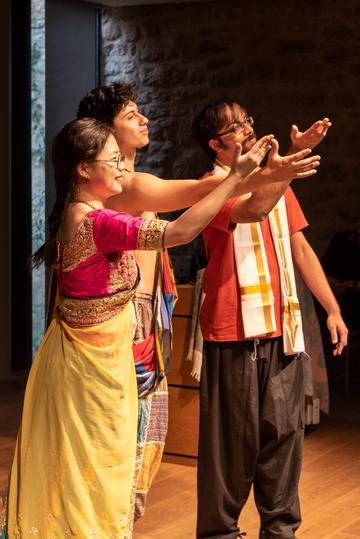The Oxford Sanskrit Play

The Oxford Sanskrit Play is a student-led project, which organizes the production of a Sanskrit play, performed in Sanskrit (with subtitles) by a cast of undergraduate and graduate students in the Faculty.
In reading a play in Sanskrit, our students dissect the language to understand the story, but that dissection has the danger of obscuring the rich emotion and artistic brilliance which that language underlies. The idea of the Sanskrit Play was conceived by our students in order to bring to life this fine literature and to allow it to be appreciated fully, as more than simply words on a page.
The first Oxford Sanskrit Play was a performance of Bhāsa’s Madhyamavyāyoga or ‘The Middle One’, put on in March 2020. Following a two-year break due to Covid restrictions, the Sanskrit Play returned in March 2022, with a performance of Kālidāsa’s Vikramorvaśīyam, or ‘How Urvaśī was Won’. In March 2024, we performed Bhavabhūti’s Mālatīmādhava ‘Mālatī and Mādhava’. Our plays have all had sell-out audiences, with attendees including school groups travelling from London and other cities.
The first two plays were supported by the Oxford Research Centre in the Humanities, the Faculty of Asian and Middle Eastern Studies and the Queen's College, Oxford. The third play was financially supported by the Oxford Buddhist Studies Society, the Faculty of Asian and Middle Eastern Studies, and the Queen’s College, Oxford.
2024 – Mālatīmādhava
Mālatī and Mādhava relates an intricate tale of love between the eponymous heroine and hero, and between their friends, Makaranda and Madayantikā. The play blends the sentiment of love with strains of horror to create a masterpiece of literature. A specially abridged version was performed in March 2024 by: Althea Sovani (Mālatī and director), Siddhant Golwalkar (Mādhava and associate director), Yuling Wu (Avalokitā and associate director), Poorva Palekar (Buddharakṣitā), Dr. Victor D’Avella (Bhūrivasu), Nicholas Romanos (Kalahaṃsaka), Dr. Pankhuri Dudani (Kāmandakī), Aamir Kaderbhai (Kapālakuṇḍala), Kalki Beadell-Kaplan (Lavaṅgikā), Shruthi Mathews (Līlā), Jichu Yang (Madayantikā), Lucas Ali-Hassan (Makaranda), Victoria Hamilton (Mandārikā), Kshitij Jain (off-stage voice), Dillon Kelly (puruṣa), and Laura Kościelska (Ramā).
2022 – Vikramorvaśīyam
How Urvashi Was Won relates the story of King Purūravas, a mortal, and his love for a celestial dancer named Urvaśī. The play by Kālidāsa, the most famous and celebrated Sanskrit poet, reworks this ancient tale of tragic love into a masterpiece of drama and poetry. A specially abridged version was performed in March 2022 by: Shree Nahata (DPhil Sanskrit), Purūravas; Poorva Palekar (MPhil Classical Indian Religions), Urvaśī (and director); Althea Sovani (BA Classics and Sanskrit), Citralekhā; Krishna Subrahmanian (MPhil Classical Indian Religions), Vidūṣaka; Léone Van Den Schrieck (BA Classics and Sanskrit), Rambhā; Qingniao Li (DPhil Buddhist Studies), Menakā; Sasha Taylor (BA Religious Studies and Sanskrit), Tāpasī; Klemens Okkels (BA Sanskrit), Kumāra; Joseff Howells (MPhil Classical Indian Religions), Nārada; Jacob Parkinson (MPhil Classical Indian Religions), Sūta/Kañcuki; Cody Fuller (MPhil Buddhist Studies), Citraratha; Yizhou Liu (Mst Oriental Studies), Sūtradhāra (and producer); Yuling Wu (BA Sanskrit), Kirātī; Qiaorong Yu (BSc Physics), Yavanī; Tuan Huynh (DPhil Buddhist Studies), Bharata; Dr Bihani Sarkar (Departmental Lecturer), celestial singer; Dr Victor D’Avella (Departmental Lecturer), Indra.
2021 – Madhyamavyāyoga
Bhāsa’s ‘The Middle One’ tells the story of the reunion of the half-rākṣasa Ghaṭotkacha and his rākṣasa mother Hidimbā with Ghaṭotkacha’s father, the mighty warrior Bhīma. A touching tale exploring the complexities of family relations, it centres on the rescue of a brahmin family who are forced by Ghāṭotkacha to choose one of their number as a sacrifice to his mother’s hunger. The full (one-act) play was performed in March 2020 by: Yizhou Liu (BA Sanskrit), Keśavadāsa (and producer and director); Nadia Adal (BA Sanskrit), Keśavadāsa’s wife; Barbora Sojkova (DPhil Sanskrit), Valters Negribs (DPhil Sanskrit) & Qingniao Li (DPhil Buddhist Studies), Keśavadāsa’s three sons; Jezian Tudor (BA Sanskrit), Ghaṭotkacha; Shree Nahata (DPhil Sanskrit), Bhīmasena; You Zhao (MPhil Buddhist Studies), Hidimbā; Yiming Shen (DPhil Sanskrit), stage-director (sūtradhāra).



